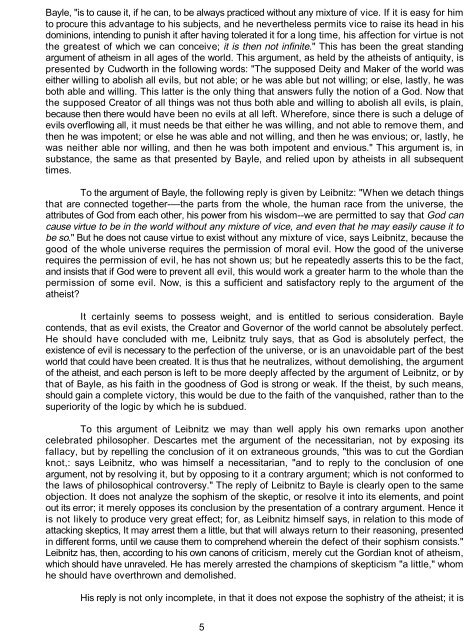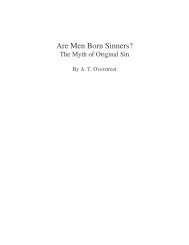Foreknowledge by Joel Hayes - Library of Theology
Foreknowledge by Joel Hayes - Library of Theology
Foreknowledge by Joel Hayes - Library of Theology
You also want an ePaper? Increase the reach of your titles
YUMPU automatically turns print PDFs into web optimized ePapers that Google loves.
Bayle, "is to cause it, if he can, to be always practiced without any mixture <strong>of</strong> vice. If it is easy for him<br />
to procure this advantage to his subjects, and he nevertheless permits vice to raise its head in his<br />
dominions, intending to punish it after having tolerated it for a long time, his affection for virtue is not<br />
the greatest <strong>of</strong> which we can conceive; it is then not infinite." This has been the great standing<br />
argument <strong>of</strong> atheism in all ages <strong>of</strong> the world. This argument, as held <strong>by</strong> the atheists <strong>of</strong> antiquity, is<br />
presented <strong>by</strong> Cudworth in the following words: "The supposed Deity and Maker <strong>of</strong> the world was<br />
either willing to abolish all evils, but not able; or he was able but not willing; or else, lastly, he was<br />
both able and willing. This latter is the only thing that answers fully the notion <strong>of</strong> a God. Now that<br />
the supposed Creator <strong>of</strong> all things was not thus both able and willing to abolish all evils, is plain,<br />
because then there would have been no evils at all left. Wherefore, since there is such a deluge <strong>of</strong><br />
evils overflowing all, it must needs be that either he was willing, and not able to remove them, and<br />
then he was impotent; or else he was able and not willing, and then he was envious; or, lastly, he<br />
was neither able nor willing, and then he was both impotent and envious." This argument is, in<br />
substance, the same as that presented <strong>by</strong> Bayle, and relied upon <strong>by</strong> atheists in all subsequent<br />
times.<br />
To the argument <strong>of</strong> Bayle, the following reply is given <strong>by</strong> Leibnitz: "When we detach things<br />
that are connected together-—the parts from the whole, the human race from the universe, the<br />
attributes <strong>of</strong> God from each other, his power from his wisdom--we are permitted to say that God can<br />
cause virtue to be in the world without any mixture <strong>of</strong> vice, and even that he may easily cause it to<br />
be so." But he does not cause virtue to exist without any mixture <strong>of</strong> vice, says Leibnitz, because the<br />
good <strong>of</strong> the whole universe requires the permission <strong>of</strong> moral evil. How the good <strong>of</strong> the universe<br />
requires the permission <strong>of</strong> evil, he has not shown us; but he repeatedly asserts this to be the fact,<br />
and insists that if God were to prevent all evil, this would work a greater harm to the whole than the<br />
permission <strong>of</strong> some evil. Now, is this a sufficient and satisfactory reply to the argument <strong>of</strong> the<br />
atheist?<br />
It certainly seems to possess weight, and is entitled to serious consideration. Bayle<br />
contends, that as evil exists, the Creator and Governor <strong>of</strong> the world cannot be absolutely perfect.<br />
He should have concluded with me, Leibnitz truly says, that as God is absolutely perfect, the<br />
existence <strong>of</strong> evil is necessary to the perfection <strong>of</strong> the universe, or is an unavoidable part <strong>of</strong> the best<br />
world that could have been created. It is thus that he neutralizes, without demolishing, the argument<br />
<strong>of</strong> the atheist, and each person is left to be more deeply affected <strong>by</strong> the argument <strong>of</strong> Leibnitz, or <strong>by</strong><br />
that <strong>of</strong> Bayle, as his faith in the goodness <strong>of</strong> God is strong or weak. If the theist, <strong>by</strong> such means,<br />
should gain a complete victory, this would be due to the faith <strong>of</strong> the vanquished, rather than to the<br />
superiority <strong>of</strong> the logic <strong>by</strong> which he is subdued.<br />
To this argument <strong>of</strong> Leibnitz we may than well apply his own remarks upon another<br />
celebrated philosopher. Descartes met the argument <strong>of</strong> the necessitarian, not <strong>by</strong> exposing its<br />
fallacy, but <strong>by</strong> repelling the conclusion <strong>of</strong> it on extraneous grounds, "this was to cut the Gordian<br />
knot,: says Leibnitz, who was himself a necessitarian, "and to reply to the conclusion <strong>of</strong> one<br />
argument, not <strong>by</strong> resolving it, but <strong>by</strong> opposing to it a contrary argument; which is not conformed to<br />
the laws <strong>of</strong> philosophical controversy." The reply <strong>of</strong> Leibnitz to Bayle is clearly open to the same<br />
objection. It does not analyze the sophism <strong>of</strong> the skeptic, or resolve it into its elements, and point<br />
out its error; it merely opposes its conclusion <strong>by</strong> the presentation <strong>of</strong> a contrary argument. Hence it<br />
is not likely to produce very great effect; for, as Leibnitz himself says, in relation to this mode <strong>of</strong><br />
attacking skeptics, It may arrest them a little, but that will always return to their reasoning, presented<br />
in different forms, until we cause them to comprehend wherein the defect <strong>of</strong> their sophism consists."<br />
Leibnitz has, then, according to his own canons <strong>of</strong> criticism, merely cut the Gordian knot <strong>of</strong> atheism,<br />
which should have unraveled. He has merely arrested the champions <strong>of</strong> skepticism "a little," whom<br />
he should have overthrown and demolished.<br />
His reply is not only incomplete, in that it does not expose the sophistry <strong>of</strong> the atheist; it is<br />
5






